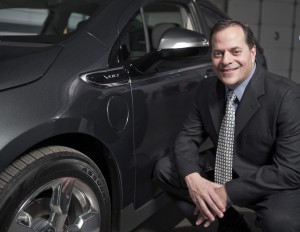General Motors is realigning critical areas of its business to create, effective Feb. 1, a dedicated Autonomous and Technology Vehicle Development Team.
GM said in an internal announcement the combined team will focus on accelerating the company’s technical capabilities and create the future direction of GM vehicle programs in the autonomous and technologically advanced vehicle space.
Doug Parks, who had been Vice President, Global Product Programs, is leading the new effort as Vice President, Autonomous Technology and Vehicle Execution. According to GM, the group is responsible for “creating and executing autonomously driven vehicles in addition to advanced technology vehicle programs, including hybrids, battery-electric and fuel-cell vehicles.”
“Parks and his team will be the single point accountable for all critical technologies and total vehicle solutions in the areas of electrical architecture, controls and software, system and safety integration, development and validation, sourcing and execution,” the company said in a statement.
(FTC sanctions GM, two dealership groups over recall issues. For more, Click Here.)
Parks will report directly to Mark Reuss, GM vice president of global product development, purchasing and supply chain. The focus on advanced vehicle technologies means additional responsibilities for other GM executives as well.
- Pam Fletcher, executive chief engineer, Global Electric Vehicles, will add the Autonomous Chevrolet Volt Campus Fleet to her responsibilities. She also will lead a team focused on strategic planning and competitive assessments within the autonomous and electric vehicle space.
- Sheri Hickok, chief engineer, Next Generation Light Duty Pick-Up, was appointed Executive Chief Engineer, Autonomous JVs and Fleet Execution. She will lead the execution teams of autonomous fleets and the strategy and development of related key partnerships and joint ventures.
- Andrew Farah, chief engineer, Global Electrified Vehicles, was promoted to Chief Technology Architect, Autonomous Systems. Farah will lead the technical activities of the teams empowered to create hardware, software and controls mechanisms which support autonomous vehicles. In addition, he will lead the Global Product Development teams focus on technologies required for autonomous vehicle operations.
- Scott Miller, director, Global C02 Strategy, Energy, Mass and Aerodynamics, was appointed Director, Autonomous Vehicle Integration. He will be the technical director for Autonomous feature and controls integration, vehicle and feature validation, and vehicle development teams.
(Click Here for details about new active safety tech that may reduce rear-end crashes by 40%.)
Expanding the group focusing on this level of autonomy and technology shouldn’t be a surprise. GM has been pushing its technological prowess for the past several years. The latest effort is the company’s introduction of the new Chevy Bolt.
The EV may be the first viable, mainstream affordable vehicle built in high volumes. Expected to get 200 miles on a full charge, the Bolt is expected to cost $35,000 after government tax breaks. The vehicle mitigates two of the biggest problems EVs have faced: limited range and cost.
The automaker is also making big moves on the personal mobility front that may be impacted by this new unit down the road. General Motors apparently hopes to become an industry maven when it comes to alternative mobility programs. After investing in two ride-sharing services, Lyft and Sidecar, this month, the Detroit automaker says it will start a new car-sharing company called Maven – a Yiddish word for “expert.”
“With the launch of our car-sharing service through Maven, the strategic alliance with ride-sharing company Lyft, and building on our decades of leadership in vehicle connectivity through OnStar, we are uniquely positioned to provide the personalized mobility services our customers expect today and in the future,” GM President Dan Ammann said.
(To see more about the safety consortium between the feds and 18 automakers, Click Here.)
GM began the month by announcing a $500 million investment in Lyft, the chief rival to ride-sharing service Uber, then followed up with a partnership with Sidecar. The company is not saying how much it will spend to get Maven going, though it did say the car-sharing firm will have a staff of 40 employees who have been hired from the connected car field, as well as from Sidecar, Google and rival car-sharing service Zipcar.


A 200 mile range in ideal conditions, maybe. Check the range in Detroit, NYC, Chicago in the Winter with snow and the heater on and LA, Miami, Dallas in the Summertime with the A/C on.
It’s disgraceful and illegal to force tax payers to subsidize these personal vehicles which will become a toxic waste issue in less than a decade. You can fool some of the people some of the time.
Hopefully GM is more serious about safety on their AVs than they are about practicality of their EVs.